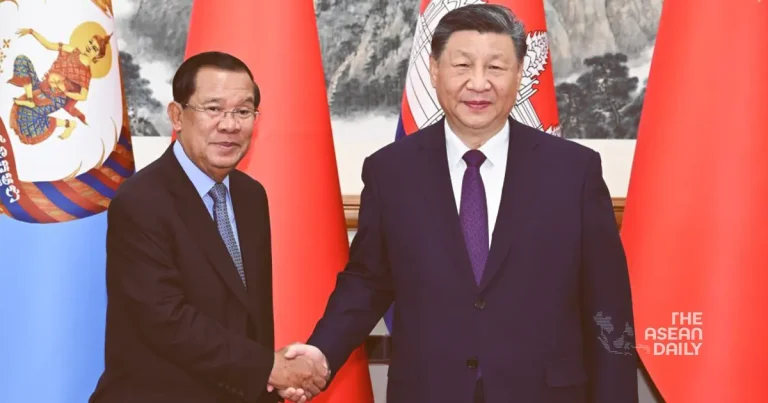4-12-2024 (PHNOM PENH) Chinese President Xi Jinping and Cambodian Senate Chairman Hun Sen pledged to reinforce bilateral ties during high-level talks at Beijing’s Diaoyutai State Guesthouse on Tuesday, emphasising their commitment to an enduring strategic partnership.
During the meeting, President Xi characterised the Sino-Cambodian relationship as an exemplary model of high-quality diplomatic engagement, emphasising its alignment with both nations’ fundamental interests. Xi reaffirmed China’s view of Cambodia as a cornerstone of its regional diplomatic strategy, proposing to establish what he termed a “high-quality, high-level and high-standard community with a shared future.”
The talks took place against a backdrop of global geopolitical uncertainty, with both leaders acknowledging the challenges facing developing nations. Xi emphasised the importance of maintaining regional stability, expressing support for ASEAN’s strategic autonomy and warning against the introduction of Cold War mentalities into Southeast Asian affairs.
A significant feature of the discussions was the expansion of the “Diamond Hexagon” cooperation framework, which encompasses six crucial sectors: political coordination, industrial capacity, agricultural development, energy cooperation, security collaboration, and cultural exchange. This framework, initially proposed during Hun Sen’s previous visit to Beijing in February 2023, aims to create a comprehensive partnership structure.
The leaders also discussed plans to develop an “Industrial Development Corridor” and a “Fish and Rice Corridor,” integrating these initiatives with China’s ambitious Belt and Road Initiative and Cambodia’s domestic “Five-Corner Strategy.”
Hun Sen, who transitioned from his role as Prime Minister to Senate Chairman in April, used his first visit to China in his new capacity to reassure Beijing of Cambodia’s unwavering commitment to the bilateral relationship. Speaking through the Cambodia-China Times, he emphasised that the Cambodian People’s Party’s pro-China stance represents a fundamental political position that would persist through leadership transitions.
The meeting marks a continuation of diplomatic momentum between the two nations, with China seeking to strengthen its influence in Southeast Asia through strategic partnerships. Both leaders expressed their dedication to fostering peace, development, and progress in the international arena, particularly emphasising the importance of strengthening the voice of developing nations, often referred to as the “Global South.”




